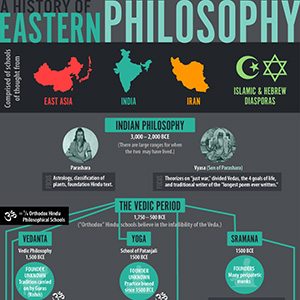When, where and how did bhakti become acceptable within the Indian intellectual élites?
Category Archives: Sanskrit Philosophy
A chart of the “History of Eastern Philosophy”
Most readers will have already noted this chart of “Eastern Philosophy” at Superscholar.

Now, I have already commented about it at DailyNous, but the staff of Superscholars has written to me twice to advertise the map, so that I feel compelled to repeat my comment and some further ones here. I would also like to ask readers: Do you think these maps have some use at all? If so, for whom? Beginners or Advanced scholars?
Daya Krishna’s “Creative Encounters with Texts”
Daya Krishna was an Indian philosopher, a rationalist and iconoclast, who constantly tried to question and scrutinise acquired “truths”. The main place for such investigations was for him a saṃvāda ‘dialogue’. That’s why he also strived to organise structured saṃvāda inviting scholars from different traditions to debate about a specific problem. The minutes of such dialogues have been published in Saṃvāda and Bhakti.
What is a body? Veṅkaṭanātha on plants, rocks, and deities
In general, classical Indian philosophers tend to define śarīra ‘body’ as a tool for experience (bhogasādhana). Thus, many philosophers state that plants only seem to have bodies because of our anthropomorphic tendencies, which make us believe that they function like us, whereas in fact plants cannot experience. By contrast, Veṅkaṭanātha in the Nyāyasiddhāñjana defines śarīra in the following way:
Veṅkaṭanātha’s epistemology, ontology and theology
In the world-view of a fundamental Viśiṣṭādvaita Vedānta teacher like Vedānta Deśika (1269–1370, aka Veṅkaṭanātha), theology is the center of the system and epistemology and ontology assume their role and significance only through their relationship with this center.
Jaina libraries in India
Readers might have noticed that I am working on the availability of Buddhist texts after the disappearance of Buddhist communities in South India. Did the vanished Buddhist communities leave beyond libraries of Buddhist texts? —I have no evidence of that. Did Jainas collect Buddhist texts also in South India?
Buddhism in Tamil Nadu until the end of the first millennium AD
Was Buddhism ever predominant in Tamil Nadu? Which Buddhism? And when?
After my last post on the disappearance of Buddhism from South India, I received two emails of readers pointing to the fact that Buddhism must have been prosperous in Tamil Nadu, given that Dharmakīrti himself was born in Tamil Nadu and that the Maṇimēkalai (a Buddhist literary text in Tamil, datable perhaps to the 5th–7th c.) presupposes a Buddhist community and reuses materials from Śaṅkarasvāmin’s Nyāyapraveśa.
Mīmāṃsā and Grammar
Did Mīmāṃsā influence Indian Grammar? Or did they both develop out of a shared prehistory?
Long-time readers might remember that this is one of my pet topics (see this book). Probably due to the complex technicalities involved, apart from Jim Benson, not many people have been working on this topic, but in the last few days I had the pleasure to get in touch with Sharon Ben-Dor (who worked on paribhāṣās, more on his articles in a future topic) and then to receive the following invitation:
Doing things another way: Bhartṛhari on “substitutes” (pratinidhi)
Time: Friday, 17. October 2014, Beginn: 15:00 c.t.
Place: Institut für Kultur- und Geistesgeschichte Asiens, Seminarraum 1, Apostelgasse 23, 1030 Wien
Speakers: Vincenzo Vergiani and Hugo David (Cambridge)
The end of Buddhism in precolonial South India
When did Buddhism finally disappear from Tamil Nadu? And which kind of Buddhism was active in Tamil Nadu until its disappearance?

This time by Richard Payne. And they all regard papers and panels I had not been able to attend, so that combining my posts and his, you might get a wider idea of the topics dealt with during the IABS.